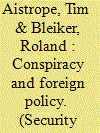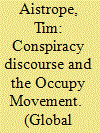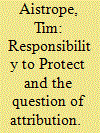|
|
|
Sort Order |
|
|
|
Items / Page
|
|
|
|
|
|
|
| Srl | Item |
| 1 |
ID:
159784


|
|
|
|
|
| Summary/Abstract |
Conspiracies play a significant role in world politics. States often engage in covert operations. They plot in secret, with and against each other. At the same time, conspiracies are often associated with irrational thinking and delusion. We address this puzzle and highlight the need to see conspiracies as more than just empirical phenomena. We argue that claims about conspiracies should be seen as narratives that are intrinsically linked to power relations and the production of foreign policy knowledge. We illustrate the links between conspiracies, legitimacy and power by examining multiple conspiracies associated with 9/11 and the War on Terror. Two trends are visible. On the one hand, US officials identified a range of conspiracies and presented them as legitimate and rational, even though some, such as the alleged covert development of weapons of mass destruction in Iraq, are now widely considered false. On the other hand, conspiracies circulating in the Arab-Muslim world were dismissed as irrational and pathological, even though some, like those concerned with the covert operation of US power in the Middle East, were based on credible concerns.
|
|
|
|
|
|
|
|
|
|
|
|
|
|
|
|
| 2 |
ID:
118023


|
|
|
|
|
| Publication |
2013.
|
| Summary/Abstract |
Conspiracy theory has come up frequently in general media commentary around the Occupy Wall Street movement. For all their good intentions, Occupy is hampered by a paranoid style of populism that sees nefarious elites behind everything - or so the story goes.1 This paper takes the conspiracy discourse around Occupy as an entry point into the underlying dynamics of power and interpretation that help set the conditions of possibility for dissent in the liberal context.
|
|
|
|
|
|
|
|
|
|
|
|
|
|
|
|
| 3 |
ID:
172551


|
|
|
|
|
| Summary/Abstract |
World politics generates a long list of anxiety-inspiring scenarios that threaten to unravel everyday life with sudden and violent destruction. From total war and the concentration camps, through nuclear firestorms, global pandemics and climate disaster, the diabolical violence of the recent past and conceivable future is the stuff of nightmares. Yet International Relations scholars and practitioners are often criticized for being disconnected from the human realities of international calamity. The challenge for both is to engage world politics in a way that foregrounds the human consequences of extreme violence and depravation. In this article, we explore these difficult experiences through popular culture representations of the apocalypse, a subject of intense interest for researchers in a discipline where global destruction is a distinct possibility. However, we take a different route by engaging the apocalypse through the horror genre, the one place where human suffering is explicitly accentuated. We argue that the horror genre is at once an access point for ethical engagement with the human consequences of extreme violence and a complex terrain where dark imaginings can be politically loaded, culturally specific and ethically ambiguous.
|
|
|
|
|
|
|
|
|
|
|
|
|
|
|
|
| 4 |
ID:
161325


|
|
|
|
|
| Summary/Abstract |
This article explores the problem of attribution in the context of Responsibility to Protect (R2P) intervention through an analysis of the Syrian chemical weapons attack of 2013. We argue that R2P advocates can be confronted by a crisis dynamic where the political momentum for military intervention runs ahead of independent verification and attribution of mass atrocity crimes. We contrast the political momentum for intervention with the technical process of independent attribution and show that the sort of independent evidence that would ideally legitimize an R2P intervention was unavailable when there was political momentum for action. Conversely, the information that was available (which inevitably informed the political momentum for action) was largely produced by state intelligence organizations – or a potentially briefed media – and shaped by the interests and priorities of its end users. While understandable in the face of the ‘extreme’, we suggest that the mobilization of political momentum by R2P advocates entails significant dangers: first, it risks undermining the integrity of R2P if evidence is later discredited and second, it risks amplifying the perception that states sometimes exploit humanitarian pretexts in pursuit of other strategic ends.
|
|
|
|
|
|
|
|
|
|
|
|
|
|
|
|
| 5 |
ID:
143918


|
|
|
|
|
| Summary/Abstract |
With the rise of Islamic State of Iraq and Syria (ISIS), the issue of domestic radicalisation has taken on renewed significance for Western democracies. In particular, attention has been drawn to the potency of ISIS engagement on social media platforms like Twitter and Facebook. Several governments have emphasised the importance of online programs aimed at undermining ISIS recruitment, including the use of state-run accounts on a variety of social media platforms to respond directly to ISIS messaging. This article assesses the viability of online counter-radicalisation by examining the effectiveness of similar programs at the US State Department over the last decade. The article argues that governments attempting to counter online radicalisation of their domestic populations must take seriously the significant shortcomings of these State Department programs. The most relevant issue in this regard is the recurring problem of credibility, when the authenticity of government information is undercut by the realities of foreign policy practice, and existing perceptions of hypocrisy and duplicity are reinforced in target audiences.
|
|
|
|
|
|
|
|
|
|
|
|
|
|
|
|
|
|
|
|
|